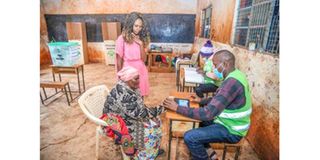IEBC forms team to promote women involvement in polls

An elderly woman votes at Gachie Primary School during the Kiambaa parliamentary by-election on July 15, 2021.
What you need to know:
- The IEBC initiated the second phase of enhanced voter registration on January 17, 2022. It will end on February 6,2022.
- Of the 19,600,000 registered voters in 2017, 46.6 per cent were women.
- The committee will also mobilise women to seek elective seats in the August 9 polls.
The Independent Electoral and Boundaries Commission (IEBC) has established a special committee to promote the participation of women in the upcoming elections.
The commission has partnered with the International Foundation for Electoral Systems to launch the Women’s Coordinating Committee for Elections.
Joyce Ekuam, acting director of IEBC voter education, partnerships, and communications, told Nation.Africa in an interview on Thursday that the committee is scheduled to undertake affirmative actions for the next three years.
It will monitor sexual and gender-based violence (SGBV) before, during, and after elections, and undertake voter education to encourage more women to register and vote.
Voter listing
The IEBC initiated the second phase of enhanced voter registration on January 17, 2022. It will end on February 6,2022. Of the 19,600,000 registered voters in 2017, 46.6 per cent were women.
The committee will also undertake grassroots activities, mobilising women to seek elective seats in the August 9 polls.
“This is an outfit to expand our reach of women and to open up our communication channels with women,” she said.
The committee is steered by seven members, including five from women-led organisations and two ex-officials from the IEBC and the National Gender and Equality Commission.
The members will liaise with other organisations across the 47 counties in conducting sensitisation drives within communities.
Fees
Already, the IEBC has reduced nomination fees for women by 50 per cent, a recommendable gender-responsive move in promoting the inclusion of women in political leadership.
In the 2017 polls, the commission allowed female independent candidates and party nominees for the parliamentary seats to pay Sh10,000, half of the fee for their male competitors. Those who sought governor and Senate seats paid Sh25,000.
County assembly nominees parted with Sh2,500. Had there been a female presidential candidate would have paid half of Sh200,00 to be cleared by the commission.
With an SGBV monitoring component, the committee will respond to the violence meted out to women during elections.
SGBV is a major election-related violence in Kenya, as established by Kenya Human Rights Commission and the International Federation for Human Rights in their comparative analysis of the violence perpetrated during the 2007, 2013 and 2017 general elections.
On Tuesday, the human rights organisations launched a report titled Sexual Violence as a Political Tool During Elections in Kenya,which cites 201 cases of sexual violence during the 2017 election period. Most cases involved gang rape.





